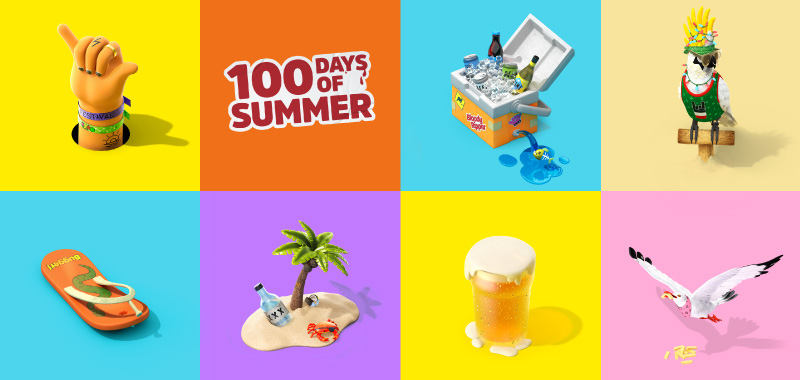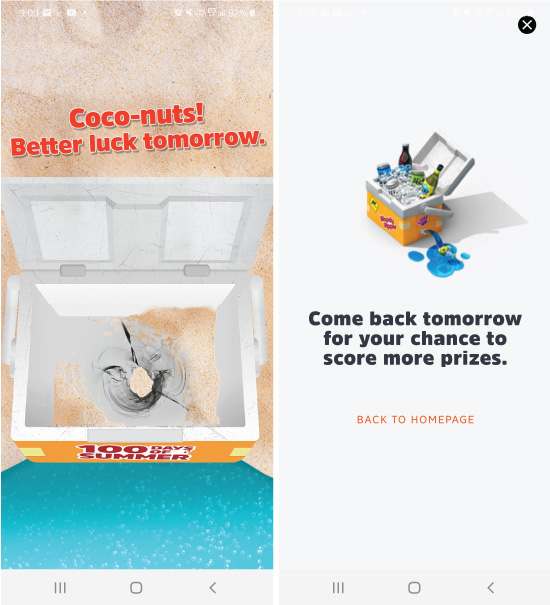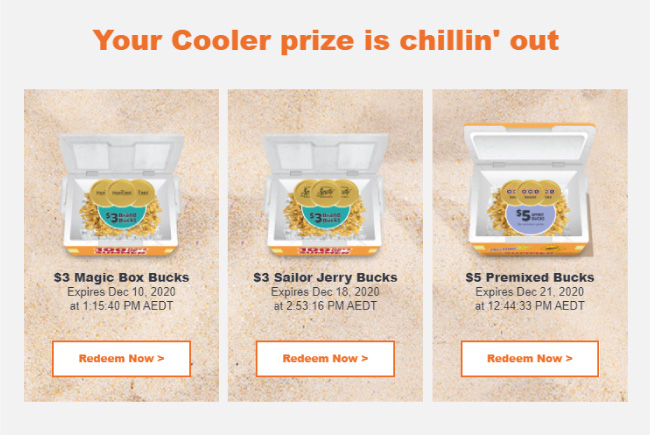
BWS are really feeling the heat after launching a 100 Days of Summer campaign that falls short of the previous year.
Every year, the 100 Days of Summer campaign kicks off summer a month early – November 1st – with a range of discounts, prizes and experiences.
Customers simply download the BWS on tAPP mobile app, login and play the BWS Cooler game (scratch and win) with a 1 in 3 chance to win from the prize pool.
First released alongside 2019’s campaign with a prize pool of $30 million, this year’s prize pool of $7 million isn’t quite living up to the hype.
The addition to this year’s game is ‘brand bucks’, an additional prize type which awards winning customers a ($3, $5 or $10) credit on a specific brand or drink in the promotion.
Many customers are unsatisfied with the short expiries that come with these credits (which has since been extended from 7 to 14 days due to strong customer feedback). Other major issues include customers having little interest in the prizes they have won, or not being rewarded as often as they’d have hoped.
One simply needs to scroll through recent app reviews to notice a trend:
“Last year the summer promotion was great you would win something every day, be a discount off a six pack of gin or a single can of bourbon. They did not expire and you could claim them anytime,” one player wrote.
After so much success of last year, this years’ campaign appears to be a letdown for many players.
One player had this to say: “This year’s promo for ‘100 Days of Summer’ is the worst. My friends and I loved it last year. It allowed us to try different beers we wouldn’t normally try at a discount. It was awesome and it felt like we won something everytime we ‘scratched the cooler’. This year, I’ve only won a $3 discount on wine after around 10 scratches. I don’t even drink wine. Not sure why they changed it. We were going into BWS on most days last promo and buying our normal favourite beers too. Terrible!”
“Brand bucks expire far too soon. Getting free items like last year would be far superior. In general, this is a worse experience than last years,” wrote another.
Sunny with a Chance of Coco-nuts!
The Loyalty & Reward Co team have been doing our own ‘research’, and we can empathise with the unhappy campers drinkers.
Straight off the bat with our first scratches we were given nothing but ‘coco-nuts’. When you don’t win, you get a pile of sand and the message ‘Coco-nuts!’ – this seems strangely off-putting.

It took until the fourth day to win anything, $3 Spirits Bucks, which were redeemable on a limited selection of spirits I had no interest in.
By the time I won something of interest ($10 Wine Bucks), I was already pretty disengaged, merely doing it for research rather than for fun. Making it worse, half of the wines my credit was redeemable on were unavailable.
In multiple instances where one team member wanted to redeem some brand bucks, there was nothing to redeem them on at all. It was a real slap, or coconut, in the face when they received marketing communications reminding them that their (unredeemable) Cooler prizes were about to expire – ouch!

Something else that was a little demoralising was to find out that the ‘Ultimate Coolers’ prizes do not come with an actual cooler. No cooler? The whole promotion is about coolers!
There are a few glaring issues:
- The time to realise the first reward is longer than expected. It’s hard enough getting people to join and engage with an app, so brands need to try hard not to lose them by rewarding them early. If capitalised on, games are a great way of generating habitual behaviours.
- From a customer perspective, some of the messaging used throughout the promotion and app (like the coconuts or the wins section) is not overly encouraging. I’m all for being ‘edgy and fun’ but rewards need to be supported by messaging which strongly communicates and reinforces value and encourages users to act.
- There is little value in a reward that has no relevancy. As reviews and my own experience shows, it is uninspiring to be given credits for products of no interest. Humans put more value on rewards they have achieved over those that are freely given – if relevant. Increasing the likelihood of winning something they desire will likely increase their propensity to transact. It would be better to allow users to choose their preferred type or category of cooler so that the credits that may be won are only applicable to a category of drinks they desire (perhaps the brand can look to its own name for some inspiration – ‘Would you prefer Beer, Wine or Spirits?’).
If it ain’t broke
There are some promising aspects of the campaign – consistent engagement streaks, unpredictable rewards, 24-hour surprise coolers – but like the problems with the brand bucks, the execution could be improved.
Many people have struggled through this year. If executed well, this year’s campaign could have given some Australians something to enjoy and look forward to during the warmer months.
BWS even said it themselves at launch: “most of us are wishing that summer would start already … We’re hoping to make this the funnest summer ever for our customers, they deserve it.”
Rather than create an opportunity for customers to feel rewarded and encourage engagement with the BWS brand, this year’s campaign seems to hinder it.
Whether it’s the lack of budget or partner buy-in, or something else entirely, this year’s 100 Days of Summer has missed the mark.
The bar may have been set a little too high last year.
Unlike the coconuts… which have certainly fallen.
Scott Harrison is a Strategy Consultant at Loyalty & Reward Co, the leading loyalty consulting firm. Loyalty & Reward Co design the world’s best loyalty programs for the world’s best brands.
Scott is a customer experience and digital marketing specialist with extensive experience in loyalty, CX, market research and member lifecycle management.
Scott co-created the book ‘Loyalty Programs: The Complete Guide’, the most comprehensive book on loyalty program theory and practice available.
Connect with Scott on LinkedIn
